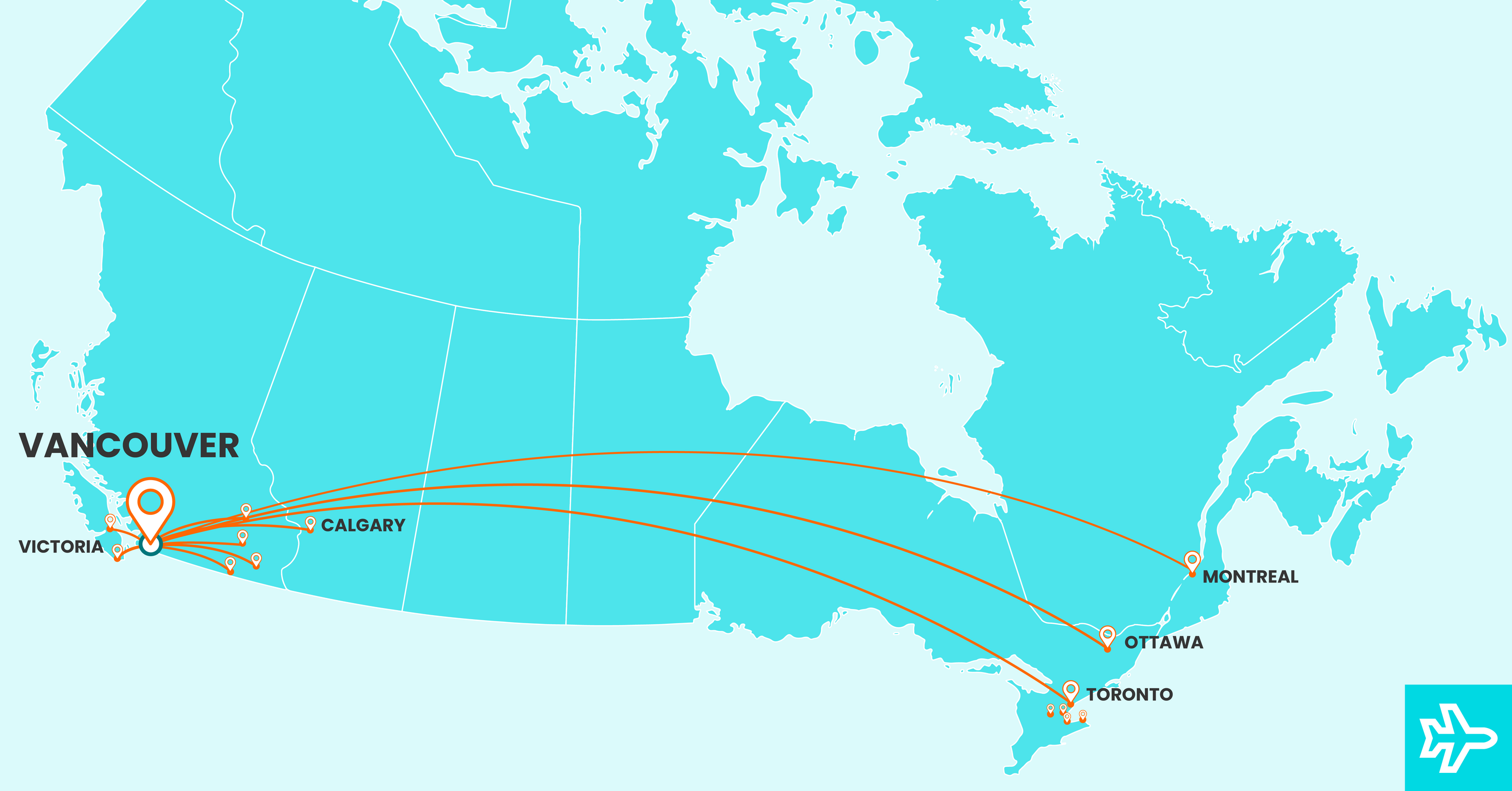As the weather warms and summer travel beckons, Canada’s roads and skies become increasingly busy. While vacations can be pricey, the environmental costs of our travels are even more significant. Bolstered by consumer demands and net zero commitments, transportation, built environment, and foodtech innovators are making increasingly ambitious promises to decarbonize travel and the essentials that go along with it.
This topic is top of mind as Foresight team members from across the country travel to Vancouver this week for our annual All Hands Team Meeting, so we thought we’d share our findings and hopefully inspire greater action on lessening our collective environmental footprint.

Air Travel
Government Initiatives in Air Travel Sustainability
In 2023, the Canadian aviation sector emitted approximately 18 million tonnes of CO2e, which accounted for a substantial share of the country's GHG emissions from transportation. The Canadian government has implemented measures to reduce the huge environmental cost of air travel, such as mandating fuel efficiency improvements for new aircraft engines and supporting the development of sustainable aviation fuels through grants. Additionally, Canada is part of the Carbon Offsetting and Reduction Scheme for International Aviation (CORSIA), governed by the International Civil Aviation Organization (ICAO). The scheme aims to stabilize international aviation emissions at 2020 levels. The Aviation Climate Action Plan, released in 2022, outlines strategies for the aviation industry to support Canada’s goal of achieving net zero emissions by 2050.
Sustainable Practices in Larger Airlines
To meet federal regulations, larger airlines are increasingly investing in sustainable aviation practices, including carbon removal systems. Innovations from ventures like Azzera (Foresight 50 honouree), creator of the CELESTE sustainability software for aviation, are pivotal in tracking emissions and ensuring compliance with regulations. Azzera collaborates with Flair Airlines on CORSIA compliance and carbon credit optimization. Azzera also supplies Pratt & Whitney Canada. Another notable innovator, Kinitics Automation (EarthTech: 2050 alumn), focuses on reducing carbon emissions and has partnered with companies like Boeing to present at global conferences, including the SMST Conference in Cascais, Portugal. The adoption of these innovative solutions by airlines and their partnerships with these ventures highlight the aviation industry's shift towards sustainable practices and innovation.
Smaller Airlines Making Big Strides
Some regional Canadian airlines are ahead of the game when it comes to cleaner air travel, like Harbour Air—a seaplane operator for coastal BC. Harbour Air has the ambitious goal of becoming the first all-electric commercial airline, and they have already made progress when the world’s first full electric commercial aircraft made its first flight from Richmond, BC in 2019. Prior to this groundbreaking step, the airline became North America’s first fully carbon-neutral airline in 2007. And they aren’t stopping there—with their ePlane project, they hope to electrify their entire fleet.
In 2022, Indigenous and woman-owned airline Iskwew Air signed a memorandum of understanding with Vancouver International airport (YVR), promising collaboration and knowledge-sharing in an effort to better connect with Indigenous communities and drive the transition to more sustainable air travel. This includes efforts to ensure the airline supports YVR’s goals of becoming entirely net zero by 2030. Upon signing the agreement, owner Teara Fraser stated “Sustainability and equity are so very important, and together we will reimagine, rematriate, and rebuild an air transportation system.” This partnership signified hope for remote Indigenous communities and entrepreneurs, and lends itself to a net zero vision for air transportation.
Ground Travel
When planning summer travel and considering GHG emissions, air transportation often comes to mind first. However, it's important to note that the aviation sector isn't the largest producer of carbon emissions. Within the transportation sector, the highest producer of GHGs is road transportation.
Public Transit
Transportation accounts for 35% of the Metro Vancouver regions’s GHG emissions. With this in mind, MetroVan’s public transit operator, TransLink, has committed to reach net zero by 2050. Their Low-Carbon Fleet Strategy was implemented in 2020, 11 years after the SkyTain began operations. The SkyTrain continues to reduce carbon emissions to 0.01 kg of CO2e per passenger, similar to an electric bus. TransLink aims to replace 34% of the current diesel bus fleet with battery-electric buses by 2030. Similarly, the Toronto Transit Commission (TTC) has committed to reducing their vehicle emissions by 100% by 2040. Since 2018, they have procured 591 hybrid-electric buses.
Personal Vehicle Travel
For personal travel, companies like EVO Car Share and Lime Scooters offer low-carbon or zero-carbon commuting options through on-demand car, e-bike, and e-scooter rentals respectively. While these services are primarily available in Western Canada, similar solutions are increasingly found in major cities across the country, including Toronto, like Bike Share Toronto.
The range of options for decarbonizing city commutes is growing and becoming more accessible throughout Canada. Additionally, walking or using a traditional bicycle are always viable alternatives. As you travel this summer, consider choosing public transit, electric rentals, or simply taking a stroll to reduce your carbon footprint.
Sustainable Accommodations
While innovators are working hard to decarbonize our transportation choices, other disruptors are tackling the built environment infrastructure we enjoy during our travels. Pan-Abode International (buildNEXT venture) manufactures eco log homes using local timber, committing to sustainability through Sustainable Forest Management (SFM) practices and employing low-carbon energy sources in their production. Their entirely Canadian-made approach minimizes environmental impact by eliminating the need for overseas supply shipments. Rohe Homes (buildNEXT venture) introduces a range of energy-efficient, eco-friendly homes using sustainably sourced, environmentally friendly, and recycled building materials, further advancing sustainable practices in construction.
Many hotel chains have also established sustainability regulations focusing on energy efficiency, waste management, and water conservation, with some pursuing LEED certification (Leadership in Energy and Environmental Design). Coast Hotels, for example, has pledged to be an entirely eco-friendly hotel chain, committing to sustainable practices including recycling, composting, sourcing sustainable foods, using biodegradable cleaning supplies, and energy-efficient lighting. They have implemented a number of initiatives aimed at reducing waste and supporting local communities.
Other short-term rental companies have also set ambitious environmental goals. Airbnb, for example, though controversial at a time when the country is experiencing a housing crisis, has lowered their GHG emissions by 17% in 2022, compared to 2019 levels, committing to 100% renewable electricity in their corporate operations. As you book your accommodations for the summer, whether hotel or short-term rental, consider staying in an eco-friendly home or supporting companies that are committed to implementing more sustainable practices.
Plant-Based Foods
In Canada, animal farming contributes significantly to GHG emissions. The agricultural sector, which includes livestock production, was responsible for approximately 7.9% of Canada's total GHG emissions in 2022. While plant-based food options are not always available when travelling, there has certainly been a shift when it comes to consumers opting for vegan alternatives and companies providing plant-based food options. While many companies like Via Rail do not include providing more plant-based food options as one of their priorities in their 2021-2025 Sustainability Plan, they are increasingly expanding their offerings and integrating more plant-based meal options into their onboard menus. Similarly, many airlines have begun offering more vegan options. For example, both Air Canada and WestJet offer vegan meal options, so long as they are ordered in advance of your flight. These options not only accommodate passengers who choose plant-based diets but also contribute to reducing the environmental footprint associated with traditional animal-based food production. This shift reflects a broader trend in the travel industry towards sustainability and meeting diverse customer needs.
While not offered yet on popular modes of transportation, innovative Canadian ventures are making their mark on the food and beverage industry, finding more sustainable alternatives to common dishes. For example, Save Da Sea (Launch and Deliver alumn) has produced plant-based seafood with familiar textures and flavours of popular seafoods like salmon and tuna. These plant-based alternatives allow us to enjoy seafood without the negative environmental impact. Susgrainable (Investor Readiness alumn) is making use of discarded barley from breweries and turning it into ready-to-use flour mixes, ultimately reducing large amounts of food waste.
Other companies are breaking ground when it comes to using the newest technology in food production and tracking, like ThisFish Inc. ThisFish Inc. has developed an AI platform to improve traceability and sustainability in the seafood industry, allowing for the identification of areas for optimization. Another Canadian venture, InHub Farms is disrupting the food industry with their innovative mushroom farming, which relies on cutting-edge technology to monitor growth and production. Mushrooms are becoming increasingly popular as a more sustainable and vegan protein source.
When deciding what to eat on your travels this summer, consider opting for snacks that support the environment, not harm it, and buying from smaller Canadian companies that are working towards a greener food industry.
Empowering Consumer Choices
In setting off on our summer travels, whether for work or leisure, it’s essential to acknowledge the impact of our travel choices and commend the innovators striving for sustainability. As Foresight staff gather in Vancouver this week, we are committed to keeping sustainability at the forefront, making greener choices whenever possible, with the aspiration that in the coming years, our journeys will be entirely sustainable.
As more companies and governments take steps towards sustainability, our individual actions as commuters, consumers, and travellers can contribute to a more sustainable future for all. Together, we can make mindful choices, ensuring that we, and future generations, can continue to enjoy summer holidays sustainably.



